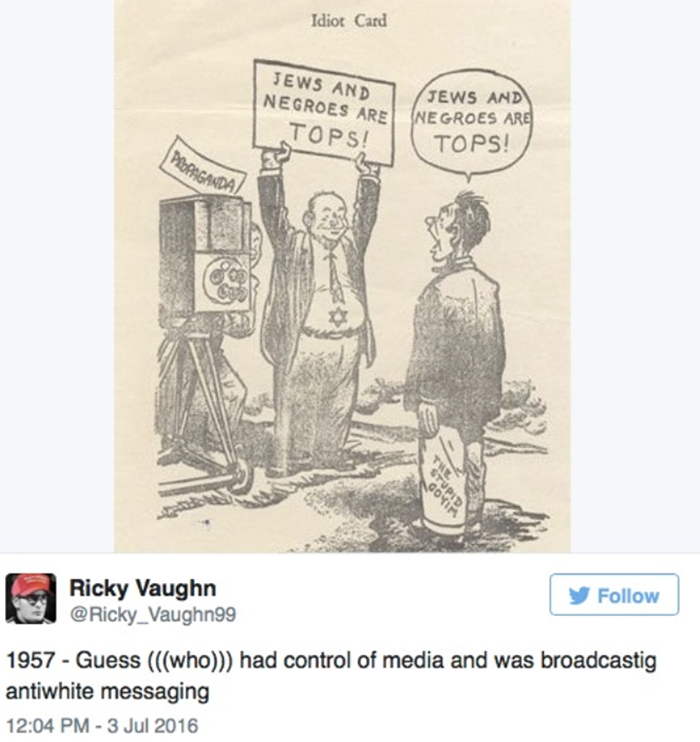Douglass Mackey Verdict Sinks 'Shitposting' Defense
The jury’s verdict carries potentially profound implications for the hard-right, anti-democracy movement that rose around the political career of former President Donald Trump. Not only does it set more clearly visible boundaries around what is legal when sowing disinformation online, prosecutors may have also created inroads to bring about charges similar to those filed against other radical-right activists who engaged in coordinated efforts to shape the outcome of elections.
As for Mackey, the verdict rejected claims he made about his intentions in 2016. Following the Department of Justice issuing charges against him in January 2021, Mackey and his supporters repeatedly portrayed his actions as “shitposting,” an internet term of art for publishing inflammatory content that is protected by the First Amendment.
Mackey elected to address the press after the verdict only through his attorney, Andrew Frisch, who promised to appeal it. Frisch declined to answer a question from Hatewatch about whether his client is active in the white supremacist movement.
Shadowy anti-democracy plot turns criminal
The trial thrust the pro-Trump “alt-right” movement into a spotlight, revealing how a coordinated synergy between the imageboard forum 4chan and the more highly trafficked social media giant Twitter enabled groups of anonymous extremists to plot out sophisticated ways to blunt voter turnout for Hillary Clinton in 2016. Evidence revealed during the trial showed Mackey participating in direct message groups where extremists carefully workshopped disinformation, and then strategically amplified it through Twitter’s algorithm to maximize chaos in a way that benefited Trump. The prosecution's star witness, a pseudonymous extremist turned pseudonymous FBI cooperator known as Microchip, was active in those groups.
Mackey, using his Ricky Vaughn persona, shared to Twitter on Nov. 1, 2016, two images, meticulously detailed to look like Hillary Clinton presidential campaign materials. The images he shared urged people to vote by text to a five-digit short code. Mackey shared those two images seven hours apart, according to the evidence revealed at trial. When he took the stand as the defense’s only witness, he claimed that he took them from 4chan. Mackey shared images featuring women of color, one Black and one Latina. The image featuring the Latina woman included Spanish instructions to vote by text.
Nearly 5,000 people texted the short code Mackey and other extremists promoted, according to prosecutors. Hatewatch overheard Mackey’s attorney Frisch speaking to a colleague during jury deliberations, and he expressed optimism about the potential outcome of the trial because the prosecution never brought to the stand a person who testified to losing their vote due to falling for the scheme.
The prosecution revealed Mackey as being obsessed with the outcome of the 2016 election, repeatedly telling his followers that it hung on “a knife’s edge.” He also specifically talked about his desires to limit or depress turnout of people he regarded to be intellectually inferior.
‘Women are children with the right to vote’
The prosecution showed that, as Ricky Vaughn, Mackey made numerous racist and misogynistic comments that identified his motive in sharing the false information about how to vote that day. When Mackey took the stand on March 23, he at times seemed visibly uncomfortable while explaining his beliefs in 2016. During cross-examinations, prosecutor Erik Paulsen carefully parsed out statements he made about women and people of color voting around the time he committed his crime.
Paulsen: Mr. Mackey, did you write, “Immigrants, the children of immigrants, et cetera, cannot be trusted to vote in the interests of their new country”?
Mackey: Yes, I did say that.
Paulsen: Why did you say that?
Mackey: Because I believed it at the time.
Paulsen: This is the time when you were sending around memes that if followed literally would trick people out of voting?
Mackey: Yes.
Paulsen: Including ones in Spanish?
Mackey: Yes, one in Spanish.
Paulsen: Mr. Mackey, we mentioned this a moment ago, but you actually didn't think women should vote; is that right?
Mackey: At the time, that's what I believed.
Mackey said on a podcast that he didn’t believe women should be allowed to vote. He also used the hashtag #Repealthe19th, referring to the Nineteenth Amendment, which granted women the ability to vote in U.S. elections. He also called women “children with the right to vote” in one tweet he published prior to committing his crime of election interference. He repeatedly expressed disdain for “unmarried women,” a segment of the population commonly derided by male supremacists.
Paulsen: So, is it correct to say that on the eve of the election, during the election, you didn’t believe women should vote?
Mackey: Yes, it is.
Paulsen: Would it surprise you that there were a number of tweets stating that fact?
Mackey: No, it wouldn’t.
Paulsen: Similarly, would it surprise you that there were a number of specific tweets in which you said that unmarried women specifically shouldn’t be voting?
Mackey: I would not be surprised.
Paulsen: Why unmarried women?
Mackey: Because unmarried women tend to vote more for Democrats than Republicans.
Paulsen: That’s the only reason?
Mackey: That’s the only reason that I remember.
Paulsen: Why not say Democrat women shouldn’t vote?
Mackey: I don’t know.
Racist pseudoscience and election lies
The prosecution set up other crucial pieces of evidence showing why Mackey believed he was more intelligent than Black voters. He repeatedly called Black people “gullible” or suggested they could be easily deceived. For example, he also targeted Black people with disinformation using the Twitter hashtag “#NeverVote,” hoping they might internalize it as being a politically appropriate response to Clinton’s shortcomings on civil-rights issues. He also spouted the kind of racist pseudoscience found on white supremacist websites including The Daily Stormer.
Paulsen: Did you write, Mr. Mackey, that “meanwhile Blacks have an average IQ of 85”?
Mackey: Yes, I did.
Paulsen: You said a moment ago, that’s actually what you did believe; is that right?
Mackey: That’s actually what I did believe at the time?
Paulsen: Yes.
Mackey: Yes.
Paulsen: So that was your belief. So, if you believed Black people were particularly stupid, why wouldn’t they fall for this?
Mackey: Because I don’t think anyone – at the time, I didn’t believe anyone could fall for that. It doesn’t matter if you’re gullible, if you’re stupid. I don’t think anyone could believe that you could text your vote anonymously. Especially when it’s coming from a Twitter account with a MAGA hat, wearing a Bane mask. I don’t think it matters whether you’re smart, stupid, gullible or not gullible. I don’t think anyone would fall for that.
In their guilty verdict, the jury ultimately rejected Mackey’s justification.
As the shitposting defense falls, new disinfo rises
Frisch, Mackey’s attorney, repeatedly called Mackey’s actions “stuff posting,” which served as his euphemism for shitposting. Mackey defined that word for the jury while defending himself on the stand.
“To me it just meant posting a lot of stuff, just kind of distract or get the conversation going, that kind of thing,” he told the jury.
Following Mackey’s conviction, influencers in the hard-right, anti-democracy space riffed on that sentiment, portraying his election interference in false or misleading ways as just a joke. Fox News talking head Glenn Greenwald called the images Mackey shared “very obviously frivolous memes” on his internet talk show. Greenwald showed his audience no context about Mackey’s beliefs or how they may have played a role in proving his motive to deceive voters.
Darren Beattie, Greenwald’s guest, whom the Trump administration let go as a speechwriter in 2018 after CNN reported on his ties to the white supremacist movement, called the images Mackey shared “satirical.” He also falsely asserted that people only texted the fake number to vote after the media had covered it. Not only did roughly 100 people text the number before the media had covered it, but the prosecution also successfully established that getting the media to cover disinformation they posted was a stated goal of the co-conspirators involved in the case, as a way of expanding their reach.
Fox News’ hard-right performer Tucker Carlson has incorrectly called Mackey “a conservative journalist” on his program. He has also made the extremist a cause célèbre on the right through multiple segments on his show. On the night of the conviction, he mischaracterized the nature of the case against Mackey, telling his viewers that Mackey faced 10 years in prison simply for mocking Hillary Clinton.
“To see a man sent to 10 years in prison, and that is what Doug Mackey is facing in the wake of his conviction today, for making fun of Hillary Clinton … and then to see Hillary Clinton remain silent,” Carlson said on March 31, before going on to call the former secretary of state a “cruel and horrible person.”
A tense trial with a brutal conclusion for the defense
Hatewatch attended jury selection in Mackey’s trial and witnessed the judge repeatedly grill prospective jurors for three days on whether they could be impartial, despite political inclinations, in determining Mackey’s guilt or innocence. Lawyers rejected scores of jurors who could be perceived as being too biased to serve. Frisch told the judge that he believed the prosecution had demonstrated prejudice against white male jurors during selection. Ultimately, white men made up one-third of the jury, and no Black people served.
Jurors had to speak to their feelings about disinformation, as well as politics. The judge also asked jurors if they had familiarity with news coverage of the trial. At least two people who didn’t make the cut acknowledged familiarity with Hatewatch’s previous reporting on Mackey. The prosecution worked hard to weed out viewers of Carlson’s Fox News show.
Deliberations went on for four days. Twice during deliberations, the jurors sought guidance from the judge about their inability to reach a unanimous verdict. During that time, Mackey’s spirits appeared to rise. Mackey waved and smiled to this Hatewatch reporter. He also tweeted about the jury’s inability to find a verdict after court on March 28 and March 29, asking people to pray for him.
On March 29, two days into deliberations, the judge read the jury an Allen charge, reminding them of their obligation to try to find common ground. On March 30, the jury asked the court to rearrange the materials they reviewed in chronological order. While passing him in the hallway that day, Hatewatch asked Frisch, Mackey’s attorney, how he felt.
“I’m tired, to be honest,” he said.
Mackey started keeping a greater distance from the courtroom on March 31, before the verdict came in. At 3:50 p.m., when the judge announced that the jury had come to a verdict, Mackey’s father, who had stayed by his side for much of the trial, audibly exhaled and closed his eyes. Mackey’s expression was inscrutable as the guilty verdict was read. Jury members opted not to speak to reporters and ignored Hatewatch’s questions as they left.
Douglass Mackey is still on Gab
Mackey testified on Thursday, March 23, that after dropping his Ricky Vaughn act, he moved from New York to Florida, where he went into “like an intensive, like psychotherapy program” seeking help to try and turn his life around.
“I had put a lot of things from my past away. I was trying to change my life, do the right thing. And I was in the process of making amends for some of the things I had done wrong in the past,” Mackey told the jury on March 23.
His roommate testified at trial that at the time Mackey inhabited his Ricky Vaughn persona, he never talked about it to him. He never knew about this other side of him, until he read about it online. The prosecution effectively painted Mackey as a person who expressed his venom for Black people, women, and others, in the privacy of a locked bedroom. Due to the incendiary nature of much of what he published, the jurors never heard that Ricky Vaughn also posted about antisemitic conspiracies or openly celebrated the brutal murder of Heather Heyer following the deadly “Unite the Right” rally in Charlottesville, Virginia, in August 2017.
Mackey remains on social media under his own name, raising money for his legal battles on Twitter and the white supremacist-friendly social media site Gab. Gab’s founder Andrew Torba referenced Mackey’s conviction in a newsletter he published under the title “Christians Must Learn To Hate Again,” which he later amended to the title “Christians Must Learn To Hate Evil Again.”
Frisch, who has also represented the white nationalist hate group VDARE, highlighted to the jury that Mackey had “apologized” in the years after appearing online as Ricky Vaughn. Mackey said he apologized to his family.
“Because it was in bad taste. It was wrong. It was offensive,” Mackey said of why he apologized to his family about his Ricky Vaughn persona.
But Mackey never said hateful things online about members of his own family. He also never tried to stop them from casting a vote through an act of deliberate deception. Mackey’s conviction suggests that his apology might have been better directed to someone else.
Photo illustration by SPLC
Legal Disclaimer:
EIN Presswire provides this news content "as is" without warranty of any kind. We do not accept any responsibility or liability for the accuracy, content, images, videos, licenses, completeness, legality, or reliability of the information contained in this article. If you have any complaints or copyright issues related to this article, kindly contact the author above.



